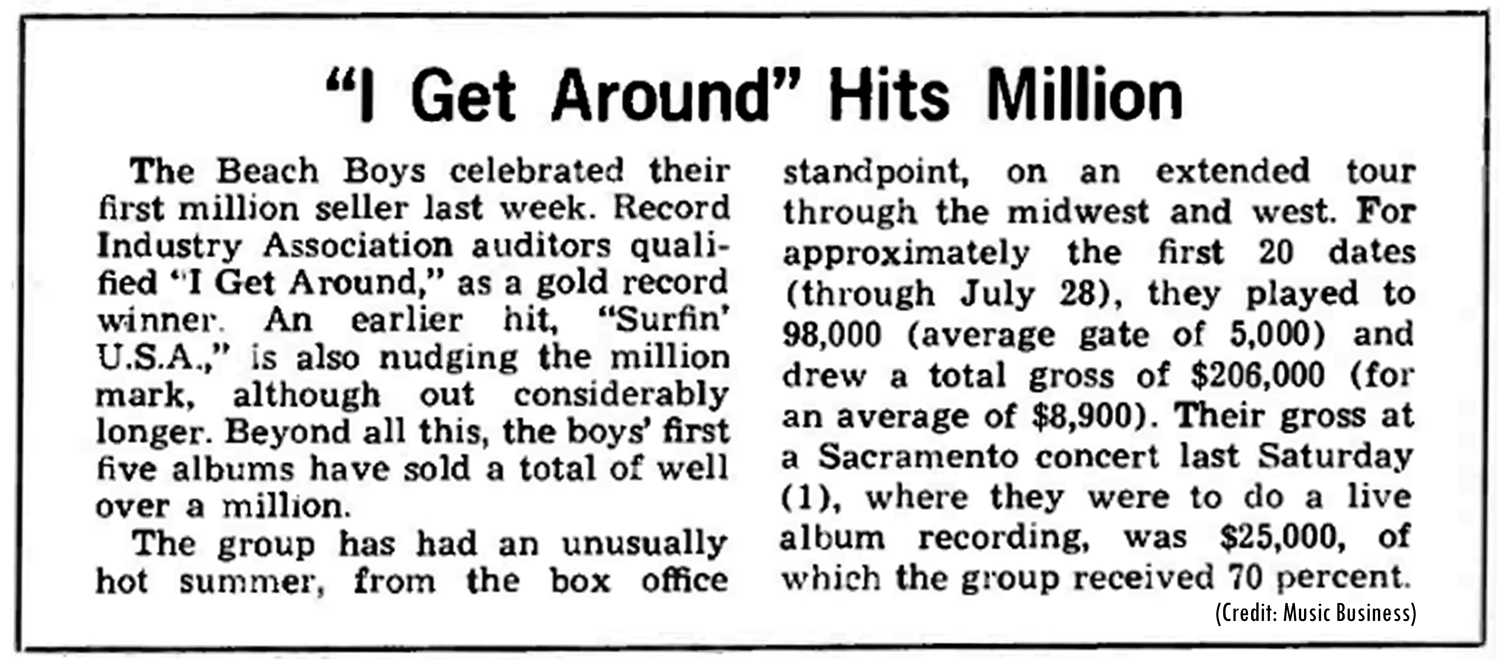 Songs about surfing, hotrods and motorscooters have made them the symbol of California youth and helped them sell millions of records
Songs about surfing, hotrods and motorscooters have made them the symbol of California youth and helped them sell millions of records
One of the most exciting new sounds in the record business, created and started by American artists and producers, is the West Coast pop sound. It has taken its place as one of the powerful forces in the industry, sparked by a flock of young, male artists on the West Coast like The Beach Boys, Jan & Dean, The Rip Chords, The Chantays, The Marketts, The Surfaris, and Dick Dale &The Deltones.
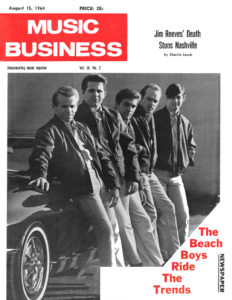 The West Coast pop sound has been identified as the “surf,” the” hotrod,” the “motorscooter, “or in general, the outdoor sound, a sound loosely tied in with various favorite outdoor sports practiced by youthful cultists in the California sunshine. Basically, the West Coast approach breaks down into two categories: the vocal style, as exemplified by the Beach Boys, Jan & Dean and the Rip Chords, and the instrumental music, proponents of which are Dick Dale, The Chantays and the Marketts. The Beach Boys, one of the hottest acts on record today, started their hit string with a surfing record on Capitol, and claim to have sired the original surf.
The West Coast pop sound has been identified as the “surf,” the” hotrod,” the “motorscooter, “or in general, the outdoor sound, a sound loosely tied in with various favorite outdoor sports practiced by youthful cultists in the California sunshine. Basically, the West Coast approach breaks down into two categories: the vocal style, as exemplified by the Beach Boys, Jan & Dean and the Rip Chords, and the instrumental music, proponents of which are Dick Dale, The Chantays and the Marketts. The Beach Boys, one of the hottest acts on record today, started their hit string with a surfing record on Capitol, and claim to have sired the original surf.
The Surfing Sound
Says Beach Boys leader, Brian Wilson: “All the kids were interested in surfing and I remember one day when my brother Dennis came home from high school telling me about his friends who thought I should write a song about surfing. I was always playing around with songs anyway, hoping maybe I could get into the business someday, so I took a crack at it right away. We called it “Surfin’, ” and my two brothers and a couple of friends and I recorded it on our own. My brother Carl, who was 14, was the only one who could play an instrument, the guitar, and he played it on the record. That was in September of ’61 and we got the record out on a small label.
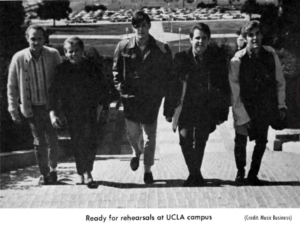 “Then, a few months later, my father, Murry Wilson, got excited about our possibilities and took one of our masters to Capitol Records where he saw Ken Nelson. Mr. Nelson referred him to Nick Venet who finally saw him after a five– week wait and flipped over the record.” Capitol’s a.&r. vice president, Voyle Gilmore, says that when Venet played him the tapes, he (Gilmore) said “Don’t let that man get away. We want to sign these boys up.” And that’s what happened. The two sides, “Surfin’ Safari” and “409,” were released right away. “We thought the` Surfin’ side would hit on the West Coast and that ‘409’ (which was about a Chevrolet) might hit in the East. But `Surfin’, broke in Detroit and we figured we had something,” said Gilmore. It was one of the first major so-called “surf” hits. At nearly the same time the Marketts, one of the beach-based instrumental groups, came out with “Surfer’s Stomp,”and “Balboa Blue,” examples of another wing of the evolving West Coast sound.
“Then, a few months later, my father, Murry Wilson, got excited about our possibilities and took one of our masters to Capitol Records where he saw Ken Nelson. Mr. Nelson referred him to Nick Venet who finally saw him after a five– week wait and flipped over the record.” Capitol’s a.&r. vice president, Voyle Gilmore, says that when Venet played him the tapes, he (Gilmore) said “Don’t let that man get away. We want to sign these boys up.” And that’s what happened. The two sides, “Surfin’ Safari” and “409,” were released right away. “We thought the` Surfin’ side would hit on the West Coast and that ‘409’ (which was about a Chevrolet) might hit in the East. But `Surfin’, broke in Detroit and we figured we had something,” said Gilmore. It was one of the first major so-called “surf” hits. At nearly the same time the Marketts, one of the beach-based instrumental groups, came out with “Surfer’s Stomp,”and “Balboa Blue,” examples of another wing of the evolving West Coast sound.
“After that one hit,” said Wilson, a good looking young Californian, who prefers to sit in his office and think and work to cavorting on the beach, “We all took up instruments. We learned how to play in a very few months. Now I play bass and we have two guitars and drums. We’ve evolved about 800 per cent since we started and that’s in just two years. What happened was that I learned the art of production. In fact, now, I think we’ve evolved away from the strictly West Coast feeling. I’ve brought some eastern production values into our records, because you can’t stand still in this business.
Riding The Trend
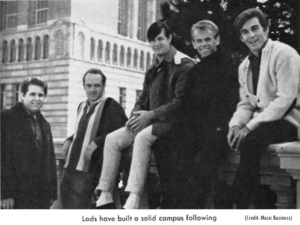 “We rode the surfing trend while it was hot. There was a good identification there. You know, like the outdoor image and that scene. But I saw a chance to maybe broaden the appeal without really changing the style at all. You know how kids are with the cars. Well, I just started writing different types of lyrics with the same musical sound, and right away we had another something going for us.”
“We rode the surfing trend while it was hot. There was a good identification there. You know, like the outdoor image and that scene. But I saw a chance to maybe broaden the appeal without really changing the style at all. You know how kids are with the cars. Well, I just started writing different types of lyrics with the same musical sound, and right away we had another something going for us.”
Capitol and the Beach Boys actually contrived to break the new hot-rod trend while holding the surf beach-head at the same time. That happened with the single which coupled “Surfin’ U.S.A.” and “Shut Down.”
It’s the only single in recent memory that ever spawned two separate hit albums, each one bearing the title of each individual hit single side. It also gave birth to a rash of hot rod albums from a rash of West Coast labels. Just as it happened at first with the surf scene. Typically, the albums were profusely illustrated with magnificent four color photos of action surf scenes, and of the many kinds of favorite hotrods in vogue with the drag-minded set. “A lot of those albums were sold”, Wilson observed, “and for several reasons. Partly it was the material, but it was also the pictures and the information and the tables of words used by this group or that group. They were playing on the two great loves of young kids, their music, and their fads.
The Honda Scene
“But now you don’t see so many of the surfing and the hot rod albums. Surfing, in fact is strictly passe. And hotrods have hit their peak too. Now it’s the Honda scene. You’ve got to be on the motor scooter kick now to be really in”.
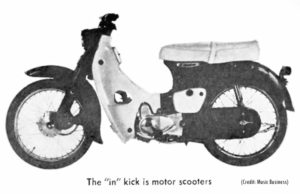 “We have a song about ‘Little Honda,’ in our new album and it’s getting played like it was a single. That is the new kick. I don’t know what will be next. Some of the younger people are trying sidewalk surfing now, where you get aboard and put some wheels under it and stand upon it going down a hill just like you were going down a wave. But I don’t think that will catch on.
“We have a song about ‘Little Honda,’ in our new album and it’s getting played like it was a single. That is the new kick. I don’t know what will be next. Some of the younger people are trying sidewalk surfing now, where you get aboard and put some wheels under it and stand upon it going down a hill just like you were going down a wave. But I don’t think that will catch on.
“As far as the Beach Boys are concerned, we just want to keep on identifying with what the young people like to do and like to think about. It doesn’t have to be specifically about surfing or cars or scooters. Our new single will be called ‘When I Grow Up (To Be A Man)’. That certainly touches what every guy is thinking about.
“I’m a little afraid of limiting our subject matter too much. In fact, I want us to just keep building as a good vocal group with a well developed sound. Some people say some of our harmonies sound like the Four Freshmen. That’s no accident. The Freshmen have been the greatest for years. Their arranger, Dick Reynolds, is practically a god to me. What he does has been a great influence on me and the group.
“I just want to keep developing that sound. I don’t know where we’ll be five years from now. I can’t look that far ahead. One year is enough and we’ll be here, I hope, singing better than ever. But there’s no sense in moving too fast.
 “There’s a lot of work in this but I like working. The other guys can have the fun, and they do. Dennis is the only real surfer we’ve got and he still does it. He also has an XKE and a Sting Ray. Carl drives around in a Grand Prix. But I’m usually in the office thinking and writing stuff. I don’t go out of my way to write a lot for others but I did write ‘Surf City,’ ‘Drag City’ and ‘New Girl In School’ for Jan and Dean. Once in a while I get out long enough to play some tennis. I played football in school and I like the competitive sports, but I like record hits too.”
“There’s a lot of work in this but I like working. The other guys can have the fun, and they do. Dennis is the only real surfer we’ve got and he still does it. He also has an XKE and a Sting Ray. Carl drives around in a Grand Prix. But I’m usually in the office thinking and writing stuff. I don’t go out of my way to write a lot for others but I did write ‘Surf City,’ ‘Drag City’ and ‘New Girl In School’ for Jan and Dean. Once in a while I get out long enough to play some tennis. I played football in school and I like the competitive sports, but I like record hits too.”
Career vs. Marriage
One of the boys in the group is already married, and Brian Wilson is thinking of it too. He has a girlfriend, Marilyn Rovell, who sings with her sister, Diane, and a cousin, Ginger Blake, in a group known as the Honeys. The Honeys had perhaps the first and one of the few girl surfer records.
“I’d like to get married, “Wilson continued, “But there’s a hang-up there for the image. I don’t think it would be good right now. With the Beatles, it’s different. John Lennon was married before they made it. It’s accepted. But to get married after you’re in the public eye could shatter the illusion.”
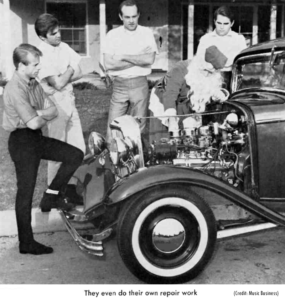 Why haven’t girl artists made it with the West Coast sound? Wilson has an answer. “In all this music, there’s an association of the outdoors and sports. This is a masculine identity. The girls a resort of spectators. Besides, there’s been so much female influence in the last couple of years with all the eastern girl groups, I think it’s kind of a reaction.
Why haven’t girl artists made it with the West Coast sound? Wilson has an answer. “In all this music, there’s an association of the outdoors and sports. This is a masculine identity. The girls a resort of spectators. Besides, there’s been so much female influence in the last couple of years with all the eastern girl groups, I think it’s kind of a reaction.
“When I said I thought surfing was passe, I meant not as a sport, but that other things are making more excitement on records, like the Hondas and the other scooters. Other sounds are too, like the Beatles; they are as “in” as any sound could ever be. They’ve done a number of interesting things, I think.
“For one thing they really broke things wide open for vocal groups. They’re a new concept too, because every one of their guys is a known personality in his own right, separate from the group image. That has really never happened before. The Beatles also glorified the drummer. Drums will be even bigger in group work from now on.
“I admire the Beatles. They have a lot of creative ability and they present their music well. It’s a synthetic-sound in a way, combining Chuck Berry, the Everly Brothers, Buddy Holly and others. But they do it very well.”
Watching The Field
Wilson watches carefully what other people are doing in records and will readily offer thumbnail opinions . . . on, for example, who is making the big impact and why . . . like Burt Bacharach. “He fascinates me. He has incorporated good music with the teen stuff and it just knocks me out to think about it.
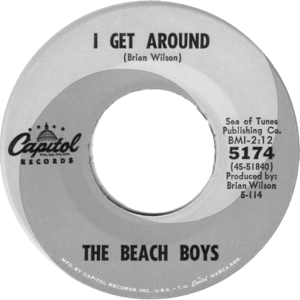 “And Phil Spector. Some say he’s cold now but there’s no such thing as a cold great talent and in any era he would be a great talent. He did so much for the production world, bringing in drums and saxes like nobody else had done. And Tamla Motown. Well with them it’s so obvious . . . like saying the sky is blue.
“And Phil Spector. Some say he’s cold now but there’s no such thing as a cold great talent and in any era he would be a great talent. He did so much for the production world, bringing in drums and saxes like nobody else had done. And Tamla Motown. Well with them it’s so obvious . . . like saying the sky is blue.
“And Chuck Berry. It’s hard to really state how much his revival has meant. It’s just tremendous. You hear that ‘Memphis’ beat in dozens of the new records. Johnny Rivers had a hit with it but the beat is everywhere. If there’s a soul of rock and roll, Chuck Berry has to be it.”
As for the Beach Boys, Wilson wants to “expand our style and versatility. I hope we can ramify our basic feel into just one of the best vocal groups. There isn’t any pat formula but it helps to know what the others are doing in the business. We’ve never been to the east but we’ll be there in September to do some concerts, and then in October, we hope, off to England, where our first hit ‘I Get Around’ is just breaking now.” END
_______________
Information, credit and news source: Music Business; August 15, 1964
MCRFB Notes: Click over photos (PC) or ‘tap and stretch’ photos (Mobile) for largest detailed view possible. Article featured below is also from the August 15, 1964 edition of Music Business.
![]()


